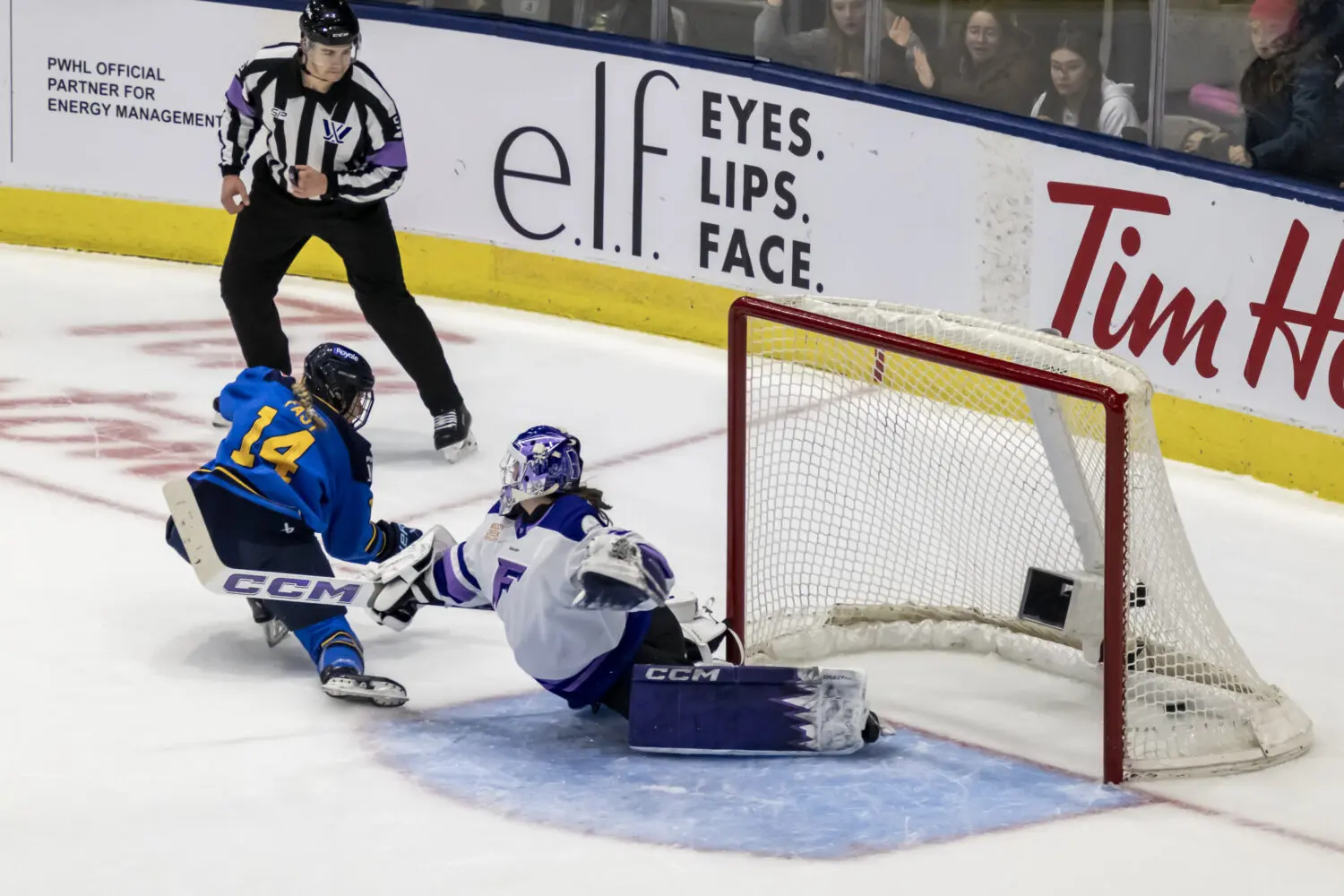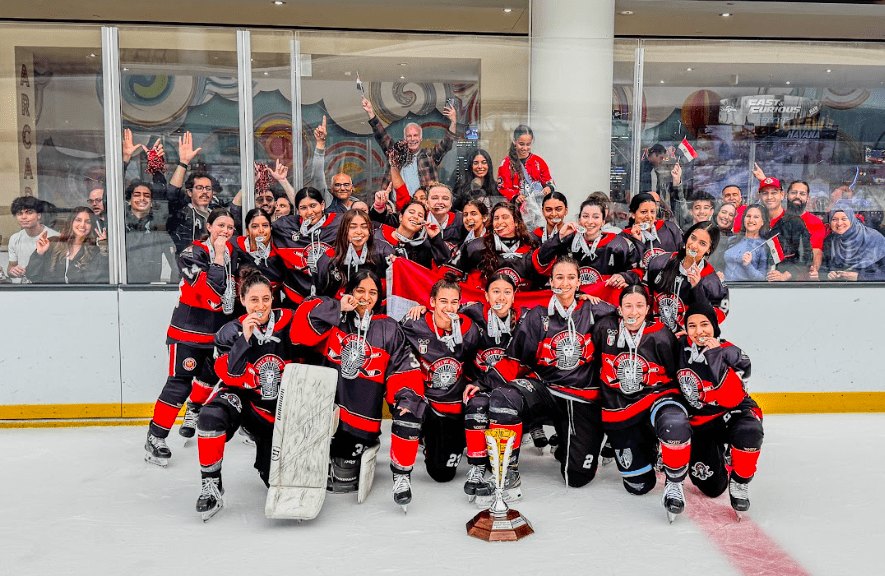Having enjoyed the historic privilege of serving as the first captain in the history of the Team Alberta/Calgary Inferno franchise, Chelsea Purcell definitely looked to extend her legacy of strong leadership while playing in Kazakhstan. Coincidentally, it also added a unique element to the legacy of women’s hockey in Saskatchewan, fostering a strong sense of Prairie pride.
Raised in the province, Purcell would compete with the University of Saskatchewan Huskies, serving as a captain, while forging a legacy as an admired teammate. Among the women that skated with the Huskies, Purcell was not the only one that would make her mark in Kazakhstan.
Gaining the experience of also calling Purcell a teammate with Team Alberta/Calgary Inferno, Huskies alum Rayna Cruickshank also donned the Almaty jersey. A 5’11”, left shooting forward, Cruickshank already possessed international experience, playing for Canada’s U18 national team.
Certainly, the universal language of hockey was evident on the ice but the language barrier provided an initial obstacle for all Canadians competing with Almaty. As Purcell recounts, the availability of a translator provided an important service, while helping all the players adjust to their new experiences. Having spent two seasons there, Purcell grew more comfortable in her second season, although the social aspect was different compared to her past experiences as a team leader,

“We were brought over to help build their program and when we first got there I must say it wasn’t what I expected. It is really quite difficult to give feedback and instruction when you can’t just easily say it. Thankfully, we always had our manager/translator handy that if we needed it we could get her to help.
I realized we use a lot of slang and things that cannot be translated so that added to the difficulty. This past season we have brought on some younger players who listen very well and it is awesome to see them learning from us. It is definitely not the same leadership style that I normally have with teams, but I am trying to make sure we are beneficial to the players while we are there.
They do not play the game the same as us and they need that guidance. I would say I am more of a leader off the ice but with this team, we do not see each other off the ice, nor can I talk with them, so I hope I am leading them on the ice (laughs).”
With an accomplished hockey background that included competing with the University of British Columbia, where she also served as team captain, and the CWHL’s Toronto Furies, Haleigh Callison certainly prepared her to take this next step in her career. With a solid work ethic and a dedication that helped set a positive example, Callison’s efforts displayed strong leadership.
Having suited up for tournaments in Finland and Latvia, along with a stint for OSC Eisladies Berlin in the Frauen-Bundesliga, Callison’s experiences quickly elevated her to a key leadership role. Becoming a role model for her Kazakh teammates to look up to, such a responsibility is one that Callison did not take likely, displaying a remarkable maturity and acumen. Understanding that her work ethic and approach to the game were likely to be emulated by others, she established a standard that she ensured would never be taken for granted.
“We were brought over there as an initiative to help improve hockey world wide. I do believe with my background as a strength and conditioning coach and having been lucky enough to play this incredible game for so many years, in different countries I was seen as a leader with the team.
A motto I do try to live by, which I learned from my long time employer and friend Peter Twist is, ‘Don’t just try to make the team, make the team stronger’. This is something I don’t take lightly.
If I am going to be a part of a team or group, I want to make a positive impact wherever and whenever possible. I am "slightly" vocal for sure; however I always try to also lead by example. Anything I would ask of a teammate, I had better be ready to exemplify that myself first.”
Undoubtedly, one of the unique aspects about playing in Europe is the opportunity to play throughout the continent. Crossing borders to play other clubs may have allowed for a combination of both sightseeing and competition, but there were also some anomalies.
While Kazakhstan shall always provide Callison with a series of treasured memories, the occasional rigors of travel were at times evident. As she recalls, the setbacks endured would soon be overshadowed by the strong sense of community and friendship that defines hockey, regardless of where it is played.
“One memory that stood out would be when we landed in Belarus and not everyone’s gear had arrived, mine was amongst the bags that did not show. (So) we had to play in other peoples gear that was piecemeal from the rinks lost and found and some of the men’s league (I believe) players in Belarus.”
Akin to other Canadians and Americans that make the sojourn to compete in Europe, Callison was not immune to the language barrier. Among the series of memories from her experiences in Kazakhstan, the team meetings presented some very challenging elements.
“That and just the number of team meetings you sit in on and cannot understand a word the coach is saying, then the translation from a 5-minute coaches speech is summed up in a sentence.
Honestly, I am sure if you ask most hockey players their most memorable moment it likely isn’t even one from on the ice, the opportunity to connect, communicate and build friendships with other hockey players from around the world is just one of the amazing things that this sport has to offer – even if you can’t speak the same language.”
The travel aspect was also an exceptional point of leisure for Karolina Urban. Gaining an opportunity to acquire a first-hand look at how the game is truly developing in other parts of the world, it provided a great sense of appreciation for the effort exerted and the subsequent sacrifices made.
As the competitive gap is one that continues to be a top priority for international women’s ice hockey, the opportunity for North American competitors to bring their skills to other parts of the world is one that is most welcome. For many of the players who make that leap, they discover that the entire experience is one that is worth treasuring, part of a collective where growth is experienced personally and professionally, in some cases, escaping one’s comfort zone. In reflecting on her time there, Urban absorbed everything to great satisfaction, finding a gratifying sense of achievement, while gaining appreciation for the efforts made in other parts of the world to grow the game,
“I would have to say I do not have one favorite moment but more generally the whole experience. First of all to see hockey develop in other countries outside of North America is really exciting. The team is supported by the Kazakhstan government and these girls are paid to play, its their livelihood, so they get to train every day.
The team also travels to Europe nearly monthly during the hockey season to play against higher caliber team including countries as Italy, Hungary, Sweden, Austria and Slovakia. So of course the traveling was an added benefit! Along with the other Canadian girls we made sure to spend our free time exploring the cities we were in.
 On the ice when we were on a line together it was nice to be able to communicate again (as the Kazakhstan girls know very limited English) which makes the game a whole lot easier.”
On the ice when we were on a line together it was nice to be able to communicate again (as the Kazakhstan girls know very limited English) which makes the game a whole lot easier.”
In reflecting on her favorite experience in Kazakhstan, there are multiple for Purcell to ponder, all supplying their own jubilation towards the culmination of a satisfying journey. Despite the language barrier that was part of the experience, Purcell recounts how the communication on the ice translated into a widespread appreciation for the game and each other, emerging as the most crucial factor in helping to bring the team together.
“That is definitely hard to choose. We have been so lucky to been given the opportunities we have had with this team. We have been able to travel all over Europe and see some pretty amazing places.
The thing about this team is that most of them do not speak English; there are only two players that speak it fairly well. When we first went over there, you realized how important communication is on the ice. So I think some of my favorite moments were when we won games and the camaraderie that we shared.
It did not need to be communicated verbally; you could just feel the excitement and see it. It was all the small things where it did not matter we didn’t speak the same language. When you could share those moments with the Kazak players and feel as one that was special.”
Urban also emphasizes that the key source of communication was on the ice. Every time they came to the rink, the homegrown players appreciated the effort being made to help make the game and their experience better.
The collaborative effort on the part of the Canadian girls to share their knowledge was reciprocated by the Kazakh girls, who were unified in their eagerness to learn. Undoubtedly, such effort resulted in a mutual respect as everyone benefited from an enriching journey that helped to raise the quality of hockey, while strengthening the core values of friendship and teamwork that must be part of any team’s culture.
“From talking with the girls on the team (through a translator or broken English) they love watching the Canadians play and say that they learn a lot from us. We try to show them set plays, give them tips and feedback. The team has a lot of respect for us and really appreciate the time we take to help their game get to the next level.
Having the opportunity to go back a few times led to stronger bonds and as a result the girls are more responsive and look to us to when the team is down or struggling to set the tone and give the team momentum.”
“All quotes obtained first hand unless otherwise indicated”
[adrotate group=”1″]
Related Articles
Categories
Recent Posts
[adrotate group=”2″]




